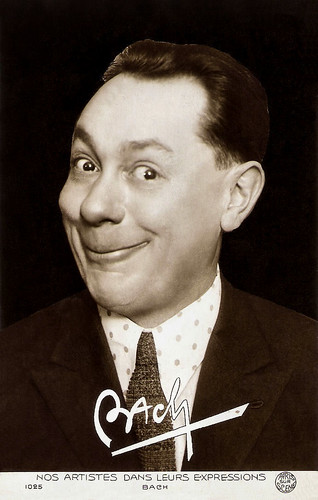
French postcard in the series 'Nos artistes dans leurs expressions' by Paris sur Scène, no. 1025.

French collector card.

French postcard by A.N., Paris, no. 884. Photo: Films Alex Nalpas.
The King of the Comique Troupiers
Bach was born in 1882 in Fontanil-Cornillon, Isère, France as Charles-Joseph Pasquier. He made his stage debut in 1899. In 1911, he made his film debut at Pathé Frères in the short silent comedy Le pot de confitures (Georges Denola, 1911). He also made short silent films for Gaumont.
In 1914, at the start of the Great War, he became a famous Music-hall performer with some great 'Comique Troupier' (coarse comedies) classics: 'Quand Madelon' (1914), 'Avec Bidasse' (1914), and 'La Caissière du Grand Café' (1914), songs which were later repeated by Fernandel. Among Bach's later popular songs were 'La rue de la Manutention' (1919) and 'Les pompiers de Nanterre' (1933).
He then formed the duo Bach and Laverne with Henry-Laverne. With Laverne, he wrote more than 200 sketches between 1928 and 1938. At the same time, he performed in music hall revues, alongside Marie Dubas or Harry Pilcer. After a long interval, he returned to the screen in early sound comedies like Une grave erreur/A Serious Mistake (Joe Francis, 1930) and Le tampon du capiston/The Capiston Tampon (Joe Francis, Jean Toulout, 1930).
In the following years, he appeared in such Comique Troupiers as En bordée/Bordered (Joe Francis, Henry Wulschleger, 1931), L'affaire Blaireau/The Blaireau Case (Henry Wulschleger, 1932) with Alice Tissot, and Le champion du régiment/The Regiment's Champion (Henry Wulschleger, 1932) with Josette Day. He co-starred with Georges Tréville and Charles Montel in L'enfant de ma soeur/My Sister's Child (Henry Wulschleger, 1933) and Bach millionnaire/Bach the Millionaire (Henry Wulschleger, 1933). Fernandel was his co-star in Le train de huit heures quarante-sept/The eight forty seven train (Henry Wulschleger, 1934) and Florelle in Sidonie Panache (Henry Wulschleger, 1934). In the latter, Bach reprised the role of Chabichou, which he created at the Châtelet in 1930-1931.
In Bout de chou/Little One (Henry Wulschleger, 1935), Bach co-starred with Pierre Brasseur. D.B. DuMonteil at IMDb: "Henry Wulschleger was a coarse comedy past master: Le train De 8H47, Le Champion Du Régiment, Tire Au Flanc ..... Although one of his stars is Charles-Joseph Pasquier aka Bach, the king of the genre, this story does not deal with grunts and does not take place in barracks. Based on a play by Yves Mirande and Julien Duvivier - both of whom were also directors, the latter being my French all-time favourite -, it is actually a melodrama, or rather a spoof on melodramas."

French postcard in the Les Vedettes de l'ecran series by Ed. R. Tricot, no. 46. Photo: (Films Alex) Nalpas.

French postcard by Editions-Cinémagazine, no. 2038.

French postcard.
The French myth of the 'Oncle D'Amérique'
In the second half of the 1930s, Bach continued to star in such farces as Debout là-dedans! (Henry Wulschleger, 1935) with Germaine Roger, Bach détective/Bach the Detective (René Pujol, 1936) with Ginette Leclerc, and Le cantinier de la coloniale (Henry Wulschleger, 1937) with Saturnin Fabre.
About the latter, D.B. DuMonteil notes: "A pleasant little comedy which blends Comique Troupier (coarse comedy) with the French myth of the 'Oncle D'Amérique', this imaginary character who epitomizes the French dream: to become a millionaire, thanks to the death of this wealthy 'Scrooge MacDuck' from the New World."
Director Henry Wulschleger had his own theatre company, in which Bach and Fabre were two of the stars. Wulschleger also directed them in Gargousse (Henry Wulschleger, 1938). Jean Boyer was the director of Mon curé chez les riches/My Priest Among the Rich (Jean Boyer, 1938) in which Bach co-starred with Elvire Popesco.
Bach's later comedies were Le chasseur de chez Maxim's/The Porter from Maxim's (Maurice Cammage, 1939) with Roger Tréville, and Bach en correctionnelle (Henry Wulschleger, 1940). His career declined after the Second World War. After the war, he appeared in two more films, Le charcutier de Machonville/The Butcher of Machonville (Vicky Ivernel, 1947) and Le martyr de Bougival/The Martyr of Bougival (Jean Loubignac, 1949).
He reappeared on stage in the late 1940s. At the age of 71, Bach died in 1953 in Nogent-le-Rotrou, Eure-et-Loir, France. He was buried in his native village of Fontanil-Cornillon, where a street was named after him. Bach was married to Pauline Doussat from 1929 till his death.

French postcard by P-C, Paris, no. 8. Photo: Nalpas. Bach sang the song 'On n' m' a pas' (a 6/8 One-Step) in L'affaire Blaireau/The Blaireau Case (Henry Wulschleger, 1932). Text by Ch. L. Pothier and René Pujol, and music by C. Oberfeld. Copyright: Editions Salabert, Paris, 1931.

French postcard by Erpé.

French collector card. Photo: Star.

French postcard by EC, no. 90. Photo: Teddy Piaz, Paris.
Sources: D.B. DuMonteil (IMDb), Wikipedia (French, Dutch and English) and IMDb.
No comments:
Post a Comment